
Nature Machine Intelligence
Scope & Guideline
Exploring the Intersection of Technology and Human Interaction
Introduction
Aims and Scopes
- Interdisciplinary AI Applications:
The journal showcases research that applies AI and machine learning techniques across various domains, including healthcare, robotics, and environmental science, highlighting the versatility of these technologies. - Methodological Innovations:
Nature Machine Intelligence publishes studies that introduce novel methodologies in machine learning, such as deep learning, reinforcement learning, and generative models, to address specific scientific challenges. - Ethical and Societal Implications:
The journal emphasizes the importance of ethical considerations in AI research, exploring topics such as algorithmic fairness, data privacy, and the societal impacts of deploying AI systems. - Data-Centric Approaches:
Research focusing on data-centric methodologies, including the use of large datasets, data augmentation, and novel data representation techniques, is a key area of interest, aiming to improve the performance and interpretability of AI models. - AI in Precision Medicine:
A significant focus is on the application of AI in biomedical research, especially in precision medicine, where machine learning is used to predict patient outcomes, personalize treatments, and discover new therapeutic targets.
Trending and Emerging
- Generative AI and Deep Learning:
There is a significant increase in research exploring generative AI techniques, particularly in applications such as drug discovery, molecular design, and synthetic data generation, showcasing the potential of these methods in various scientific fields. - AI Ethics and Responsible AI:
The journal is increasingly publishing studies that address ethical considerations in AI, such as algorithmic bias, transparency, and the societal implications of AI technologies, reflecting a growing awareness of the responsibilities associated with AI development. - AI for Healthcare and Precision Medicine:
Research focusing on the application of AI in healthcare, particularly in precision medicine, diagnostics, and personalized treatment plans, is gaining traction as the demand for AI-driven solutions in medicine continues to rise. - Reinforcement Learning in Robotics:
There is a notable trend towards applying reinforcement learning techniques in robotics, particularly for autonomous systems and humanoid robots, highlighting advancements in machine learning that enable more adaptive and intelligent robotic behaviors. - Interdisciplinary Data Science:
Emerging themes include the integration of AI with other scientific disciplines, such as environmental science, neuroscience, and social sciences, demonstrating a trend towards collaborative research that leverages AI to address complex, interdisciplinary problems.
Declining or Waning
- Traditional Statistical Methods:
There is a noticeable decline in papers focusing solely on traditional statistical methods in machine learning, as the field shifts towards more advanced deep learning techniques and neural network-based approaches. - General AI Models without Contextual Application:
Research presenting generalized AI models without specific applications or contextualization appears to be waning, as the journal increasingly favors studies that demonstrate practical applications of AI in real-world scenarios. - Narrowly Defined AI Techniques:
Papers focusing on narrowly defined AI techniques without interdisciplinary applications are becoming less prominent, reflecting a trend towards broader, integrative research that combines multiple AI methodologies.
Similar Journals
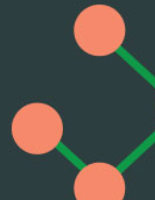
Annual Review of Biomedical Data Science
Driving Excellence in Biomedical Data Science ResearchAnnual Review of Biomedical Data Science, published by ANNUAL REVIEWS, stands as a premier journal in the fields of Biomedical Engineering, Biochemistry, Genetics, and Cancer Research, with an impressive Q1 ranking across these categories in 2023. With its ISSN and e-ISSN both assigned as 2574-3414, this journal serves as a critical resource for researchers, professionals, and students looking to delve into comprehensive reviews of the rapidly evolving landscape of biomedical data science. The journal's scope includes the intersection of data science methodologies and biomedical applications, making it essential for those aiming to stay at the forefront of innovations that drive advancements in healthcare and medical research. Although it currently does not provide open access options, its commitment to high-quality research and its robust rankings—placing it in the 94th percentile in its field—underscore its significance and credibility in the academic community. Operating from the United States, with its offices located in Palo Alto, CA, this journal is a vital contributor to the discourse on the integration of data science within biomedical fields, fostering collaboration and knowledge dissemination among scholars worldwide.
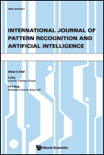
INTERNATIONAL JOURNAL OF PATTERN RECOGNITION AND ARTIFICIAL INTELLIGENCE
Transforming Theoretical Research into Practical SolutionsINTERNATIONAL JOURNAL OF PATTERN RECOGNITION AND ARTIFICIAL INTELLIGENCE, published by WORLD SCIENTIFIC PUBL CO PTE LTD, is a prestigious academic journal established in 1995 that serves as a critical platform for disseminating innovative research in the rapidly evolving fields of artificial intelligence, pattern recognition, and computer vision. With a focus on advancing theoretical and applied methodologies, the journal aims to bridge the gap between research and practical applications, making it essential reading for researchers, professionals, and students alike. The journal holds strong rankings within its categories, placing it in the Q4 for Artificial Intelligence, Q3 for Computer Vision and Pattern Recognition, and Q3 for Software as of 2023. Despite its growing influence, it continues to provide a rich resource for studies at the intersection of machine learning and computer science. The INTERNATIONAL JOURNAL OF PATTERN RECOGNITION AND ARTIFICIAL INTELLIGENCE not only contributes to academic discourse but also acts as a catalyst for technological advancement, making a significant impact on the scientific community.

Machine Learning-Science and Technology
Unlocking the potential of machine learning for a smarter future.Machine Learning-Science and Technology is a premier open-access journal published by IOP Publishing Ltd, dedicated to advancing the field of artificial intelligence, human-computer interaction, and software development. Since its inception in 2020, this innovative journal has established itself as a critical resource for researchers, professionals, and students alike, achieving a commendable Q1 ranking across multiple categories in 2023. With an impressive Scopus ranking—#70 out of 407 in Computer Science Software, #26 out of 145 in Human-Computer Interaction, and #73 out of 350 in Artificial Intelligence—it provides a platform for cutting-edge research and significant advancements in machine learning technologies. Accessibility as an open-access journal since its launch ensures that the latest findings are freely available to a broader audience, fostering collaboration and knowledge-sharing within the scientific community. The journal aims to cover a wide spectrum of topics within its scope, encouraging submissions that push the boundaries of what is possible in machine learning applications. By fostering an environment of innovation, Machine Learning-Science and Technology stands at the forefront of this rapidly evolving field, shaping the future of technology and its interaction with society.
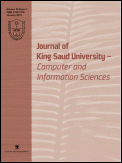
Journal of King Saud University-Computer and Information Sciences
Elevating Academic Discourse in ComputingJournal of King Saud University-Computer and Information Sciences, published by ELSEVIER, is a prestigious open-access journal focusing on the rapidly evolving fields of computer science and information technology. Since its inception in 1996, this journal has provided a platform for high-quality research and innovative ideas, promoting the dissemination of knowledge to a global audience. With a remarkable impact factor and ranked Q1 in the Computer Science (miscellaneous) category as of 2023, it stands among the top 11% of journals in its field, reflecting its commitment to excellence and relevance. The journal proudly carries the ISSN 1319-1578 and E-ISSN 2213-1248, and it is based in Saudi Arabia while being part of a global academic network. With a Scopus rank of #26 out of 232 in general computer science, the Journal of King Saud University-Computer and Information Sciences is an essential resource for researchers, professionals, and students seeking to stay at the forefront of technological advancement. As it continues to thrive through 2024, it invites contributions that will shape the future of computing and information sciences.

CAAI Transactions on Intelligence Technology
Transforming Ideas into Intelligent SolutionsCAAI Transactions on Intelligence Technology is a premier peer-reviewed journal published by WILEY, dedicated to advancing the fields of Artificial Intelligence, Computer Networks and Communications, Computer Vision and Pattern Recognition, Human-Computer Interaction, and Information Systems. Since its inception in 2017, this Open Access journal has rapidly ascended the ranks, achieving Q1 quartile status across multiple categories as of 2023, and is recognized for its rigorous standards and innovative research dissemination, evidenced by impressive Scopus rankings, including Rank #12 in Computer Vision and Pattern Recognition. Through its commitment to providing a platform for high-quality research, the journal invites contributions from scholars globally, fostering a collaborative environment that stimulates intellectual exchange and encourages advancements in intelligent technology. Addressed to researchers, professionals, and students alike, CAAI Transactions on Intelligence Technology serves as a vital resource for those aiming to stay at the forefront of technological innovation.
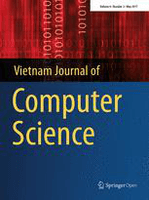
Vietnam Journal of Computer Science
Elevating the discourse in computer science through open access insights.Vietnam Journal of Computer Science, published by World Scientific Publishing Co Pte Ltd, serves as a prominent platform for researchers and professionals in the rapidly evolving field of computer science. Launched as an Open Access journal in 2013, it aims to disseminate high-quality research across various subfields, including Artificial Intelligence, Computational Theory and Mathematics, Computer Vision, and Information Systems. With its ISSN 2196-8888 and E-ISSN 2196-8896, the journal provides valuable insights and contributes to the growing body of knowledge in computer science, particularly in Southeast Asia. Despite its relatively recent establishment, the journal has achieved significant rankings, including Q3 status in multiple categories and notable visibility in Scopus metrics, evidencing its commitment to fostering innovative research. This journal is essential for those looking to stay at the forefront of computational advancements and applications, particularly in Vietnam and beyond, facilitating an engaging dialogue among scholars and industry professionals.
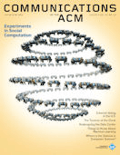
COMMUNICATIONS OF THE ACM
Illuminating Pathways in Computer ScienceCOMMUNICATIONS OF THE ACM, an esteemed journal published by the Association for Computing Machinery, has been at the forefront of the field of computer science since its inception in 1958. With an impressive impact factor and recognized as a top-tier Q1 journal in its category, it is currently ranked 10th out of 232 journals in the general computer science category according to Scopus rankings. This journal provides a vital platform for researchers, professionals, and students to disseminate innovative ideas and advancements across various domains of computing. Although it does not offer open access, the journal remains accessible through institutional subscriptions, furthering its reach and influence within the academic community. As researchers continue to explore the rapid evolution of technology, COMMUNICATIONS OF THE ACM serves as an essential resource for high-quality research, fostering knowledge advancements and collaborative discourse within the ever-expanding world of computer science.

Computer Science and Information Systems
Pioneering Research for a Digital TomorrowComputer Science and Information Systems, an esteemed journal published by the COMSIS CONSORTIUM, serves as a vital platform for researchers and practitioners within the field of computer science and information systems. With an ISSN of 1820-0214, this open access journal has been disseminating high-quality research since 2004, making scholarly content readily accessible to a global audience. Based in Novi Sad, Serbia, the journal has established itself as a point of reference in the academic community, achieving a Q3 ranking in the Computer Science (miscellaneous) category as of 2023. With its coverage spanning from 2008 to 2024, it caters to a diverse range of topics, including software engineering, data processing, and system architecture. Although the HIndex is currently not available, the journal holds a respectable 43rd percentile ranking in the Scopus database for general computer science, showcasing its relevance in the field. By offering an open access model, it ensures that groundbreaking research can be freely accessed and utilized, fostering innovation and collaboration across disciplines.

Journal of Advanced Computational Intelligence and Intelligent Informatics
Advancing Knowledge in Computational IntelligenceThe Journal of Advanced Computational Intelligence and Intelligent Informatics, published by FUJI TECHNOLOGY PRESS LTD, stands as a pivotal platform in the fields of Artificial Intelligence, Computer Vision, and Human-Computer Interaction. Established in 1997, this Open Access journal has been providing accessible insights into the latest advancements in computational intelligence and informatics since 2007. With its ISSN 1343-0130 and E-ISSN 1883-8014, this journal invites a diverse readership, including researchers, professionals, and students eager to explore innovative methodologies and applications. Despite its current Q4 ranking in the relevant categories, the journal remains committed to contributing valuable knowledge to the academic community and enhancing the global discourse in computational technologies. With its focus on fostering communication and collaboration among scholars, the journal plays an essential role in driving forward the understanding of intelligent systems and their applications in various domains.

JOURNAL OF COMPUTER SCIENCE AND TECHNOLOGY
Fostering Breakthroughs in Technology and ApplicationJOURNAL OF COMPUTER SCIENCE AND TECHNOLOGY, published by Springer Singapore Pte Ltd, is a pivotal platform in the rapidly evolving realms of computer science and technology. With an ISSN of 1000-9000 and an E-ISSN of 1860-4749, this journal encompasses a diverse array of topics including computational theory, hardware and architecture, software engineering, and applications of computer science. Spanning over three decades from 1986 to 2024, it boasts an impressive standing within academic circles, ranking in the Q2 quartile across several key categories and achieving notable placement in Scopus metrics. Although this journal operates under a subscription-based model, it remains a crucial resource for researchers, professionals, and students seeking to advance their knowledge and contribute to discussions in computer science. The JOURNAL OF COMPUTER SCIENCE AND TECHNOLOGY is committed to fostering innovation and scholarly communication in the field, encouraging submissions that contribute substantive advancements in theory and application.